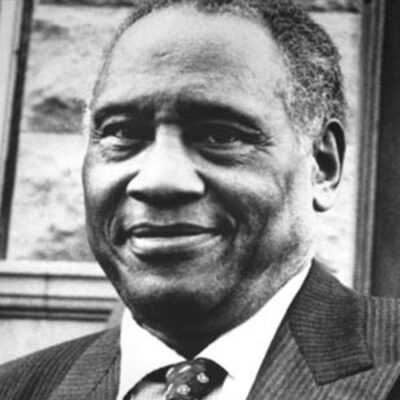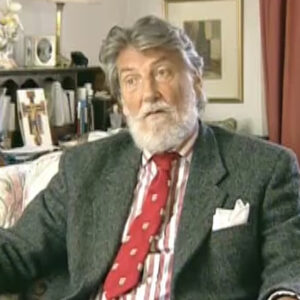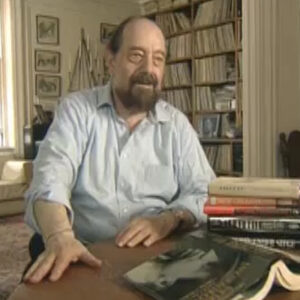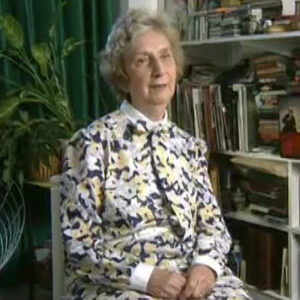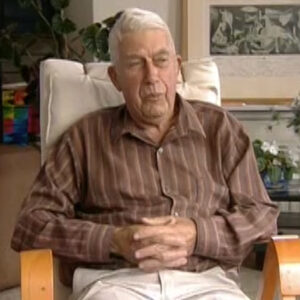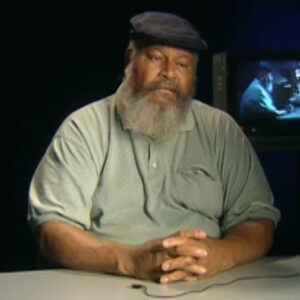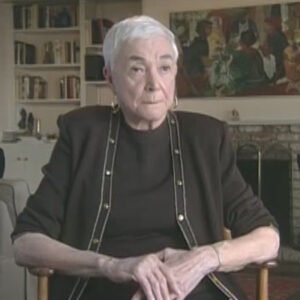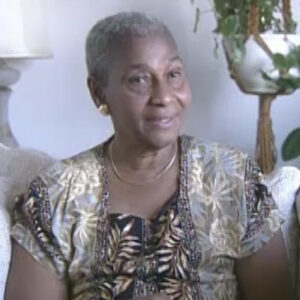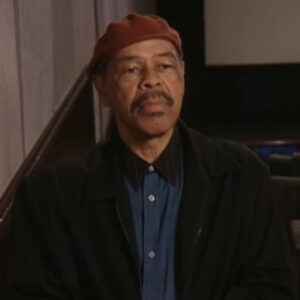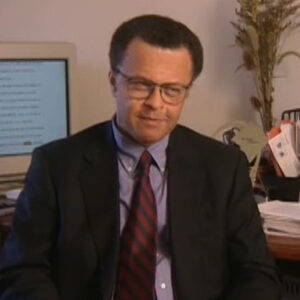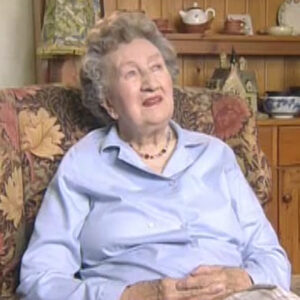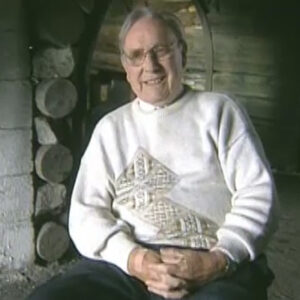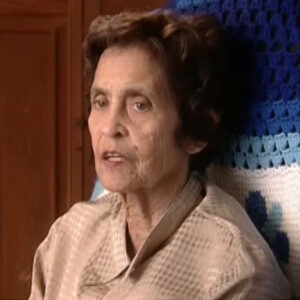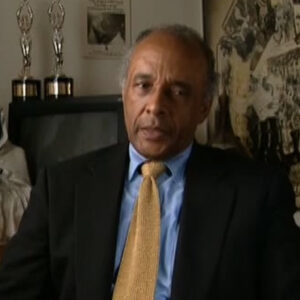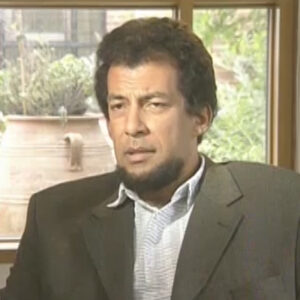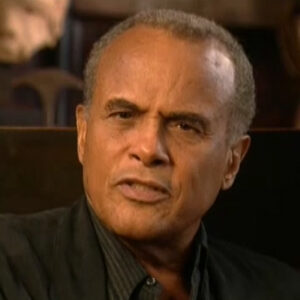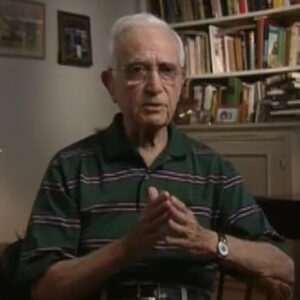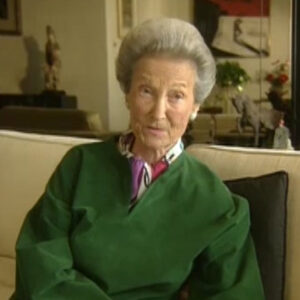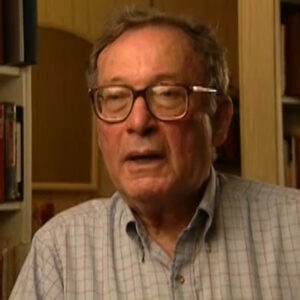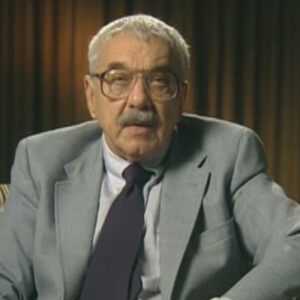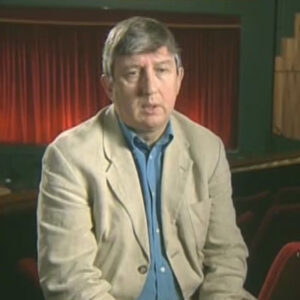Speaker I was working in Australia, actually, I heard of Paul Robeson and heard a lot of his records because I fell in love with a fellow who wrote songs for the Labor Party in Australia. And we decided that we would take off and go right the way around Australia like pioneers. And when we got above Brisbane, the tent, there was a hurricane called Hurricane Annie, and it blew our tent away. And so we moved in with a group of Australian communists at in Morton Bay. And we all sang songs about Open the Window and Let Piece Fly and all that stuff for a long time. But anyway, the main thing is that I did hear a great deal about Paul Robeson and I heard a lot of his speeches and I heard a lot of his singing then then nothing.
Speaker I mean, then I heard nothing and I went to England and that’s when I really got to know him. That’s 40 years ago. I went to England to become a member of the Shakespeare Memorial Theatre.
Speaker It wasn’t royal and it wasn’t the Royal Shakespeare Theatre. It was the Shakespeare Memorial Theatre at Stratford uneven.
Speaker And there was a brilliant young director called Tony Richardson who was planning a production of Pericles, and he had invited Paul Robeson to play gala. And Paul Robeson had accepted. And we were all in a high seat of excitement.
Speaker And just before we began the season, Paul Robeson got very ill with pneumonia and couldn’t come. So we got a man called Edric Konna, who was very tall, very good looking with deep voice, a black West Indian man. And he was very good as Gowa, but he talked nothing but racial inequality. I mean, every moment he was in the theatre, eventually we could hardly go to the green room. And we sort of said, well, if this is Eric Garner, thank God we didn’t get Paul Robeson. Well, the next year we got Paul Robeson because the same brilliant young director made a production of Othello and again invited Paul. Paul accepted. Paul came and Paul never once mentioned race.
Speaker He didn’t need to write. What was Tony Richardson’s conception of the play? I mean, he had a special conception.
Speaker And explain it to you.
Speaker How did Tony Richard? Well, Tony Richardson had just come back from America and had fallen wildly in love with the Lee Strasberg studio and the method. So everything was kind of improvisation. Everybody improvised. Now will all improvise this. We actually said the words, but we would all improvise.
Speaker I remember once, Paul, because he had been so ill rehearsed in a very thick like her grandfather’s suit, dark suit with a strap and admitted Grey will invest. And he wore a framework to keep the drafts from his head. So that’s how he rehearsed with them. And then one day in rehearsal, Tony said, I think it would be absolutely marvellous if we improvise the first jealousy. So Sam Wanamaker, who was playing Iago, immediately went to a different place on the stage, moved in different places, spoke his own lines, and it was very exciting.
Speaker Paul, who had played Othello in New York with Uta Hagen and in London with them, Peggy Ashcroft.
Speaker Paul, who knew more about Otello than any living man. Took a deep breath and came on at exactly the place where he’d been set, moved to exactly the places on the set where Tony had already advised him to go, spoke Shakespeare’s lines. Exactly. Except he prefixed everything with Jesus Christ, man.
Speaker That’s good.
Speaker Be great. Uh, so. So, I mean.
Speaker But Richardson now Richardson’s casting would be called nontraditional.
Speaker Oh, yes, I. You know, you get the best man for the job. You try to get the best man for the job. And if you can’t get him, you settle. And that’s all that casting is about at all. The casting should be about. And he was the best man for the job.
Speaker Um, what was Paul’s I mean, you talked a little bit about his physical state. Can you tell me me?
Speaker Well, you would never have known he’d been a sick man. He was about 60, I think.
Speaker And he was a very sophisticated man, a very extraordinarily bright man.
Speaker But also, he had a marvelous ability to make you feel when you were talking with him that you were terrific. I felt he he and I got on extremely well. I was 25 and he was about 60. And I’m very short, as you know. But we sought one another out at parties where everybody’s talking, talking, talking a lot of rubbish and sometimes not rubbish. But we would talk and we’d have a great time. And people began to think, hello, hello, hello, what’s going on over there? And we would walk by the river a lot talking about everything. There was nothing that I couldn’t talk to Paul about. So naturally I felt a little in love. It was impossible not to. You don’t have to worry because everything was there and that was a marriage. But Paul and I were so.
Speaker I felt so special that I was his special friend that season.
Speaker What was his emotional state like? I mean, he had just been through a horrible political struggle in the States and he had.
Speaker Oh, no, no. This is long after that. No, no, no. He’d been living in Russia and he was not. You mean, was he fragile?
Speaker Was he, you know. Sure of himself. Was he?
Speaker No, he was he was sure of himself. He was sure of himself as a man and as an artist.
Speaker Yes, as an artist.
Speaker Which of course he was a true artist.
Speaker I used to watch him what we all did. I just not making myself out of. So I only I watched sort of we all watched him.
Speaker And it was the big year that Laurence Olivier played Coriolanus. And immediately Evans played the Countess in all’s well that ends well. And it was a pretty sensational cast. Mary, you played Desdemona. Albert Finney played Casio.
Speaker Sam Wanamaker’s I said played Yogo, but Paul was the biggest man.
Speaker Oh, and Charles Laughton played Lear. So it was a pretty stunning season.
Speaker How did he relate to the cast?
Speaker Marvelously to everybody. Oh, marvelously. How did he relate?
Speaker Yeah. In other words, he didn’t play with Madonna and.
Speaker Oh no, no, he didn’t play the great actor who stepping by for a moment to give up his Othello. No, no. Marcu He didn’t have a lot to learn about us at all. We all had a lot to learn about the roles we were playing. But he was always there.
Speaker And always when you looked at him, he was helping you.
Speaker That’s why I wanted to know that he yeah, he helped me. He. I’m sorry. Bother you when your mouth is it is dry.
Speaker Aren’t you clever to notice.
Speaker Not before I did, but swish.
Speaker Oh give it a good swish. Oh.
Speaker Oh no thank you. Uh, you work with the actors so this is maybe a loaded question, but how would you rate him as an actor.
Speaker I mean, how would you evaluate him?
Speaker Oh, he was an extraordinary actor. He was an extraordinary presence on that stage. And because of his intelligence, the play was truly realized.
Speaker I think you asking me, was he a great actor?
Speaker Well, in terms of craft, I guess I mean, all craft, he had all the craft in the world. Of course, he’d been doing it for a long time.
Speaker When I met him, he was mainly.
Speaker Such a great man that he imbued with Rosillo. I’m not sure I never saw him play anything else, but he imbued the part he was playing with greatness.
Speaker He did a marvelous thing, he would perform the I think the hems of his robes and caftans, and it was a very easten perfume.
Speaker It was nothing.
Speaker It wasn’t a perfume that I could of establish as what Paul’s wearing Chanel five or anything like that. But it had a sort of musky quality. And as he walked along the halls of the backstage part of Stratford, his kaftans, because he was such a big man, his kaftans floated and waved. And as he walked, it was always this man, this marvelous aroma.
Speaker Now, about 20 years later, I was lucky enough to direct James Earl Jones in Othello.
Speaker And I asked James, would he be prepared to perform some of his Othello clothes, maybe the him, if he didn’t want to put the perfume on his body and he said no, he couldn’t possibly do that. Now, I knew that Paul was his hero.
Speaker So I said, oh, that’s sad because it was one of the very extraordinary, sensual things that I remember about Paul’s Othello. And then I got up to leave the room and he said, well, I wouldn’t know what perfume, but if you want to bring it perfume, I’ll I’ll perfume him in that darling darling story on everyone’s part.
Speaker Actually, that’s great.
Speaker Um, you obviously.
Speaker What was your take on AC.
Speaker Well, well he was small and she had grey hair by the time I knew her and she was. Fiercely strong and knew that she was Mrs. Paul Robeson, SC. And because she was so strong.
Speaker That took away from Paul having to be overtly strong.
Speaker She was a marvelous woman. I want to tell you one story.
Speaker Before the season closed at Stratford, Paul said to me, Are your parents still alive? And I said, Yes, he said in Australia. I said, yes. He said, where? I said Melbourne. He said, Would you give me the proper name and the phone number and address before the season ends? Because in two years time, we’re going to Australia on a concert tour. And I know we’re playing Melbourne and I would like to invite them as my guests. And I thought, well, that’s terrific for him to say that. But two years is a long time. But of course, I gave you the numbers about what? Not about what it seemed like right on the dot of two years time. The phone rang and my mum said, So you’ll never guess what happened. And I said, no, what happened? She said, Well, one day I got a phone call from a man who said he was Paul Robeson’s assistant and that he would like to have your father and me as his guests at the concert in the Melbourne town hall and to come to the dressing room later and to have supper with he and Mrs. Rose. And we went to the concert and his assistant came and collected us from our seats and took us backstage. And we had supper with Mr and Mrs Paul Ropes. I thought that was so extraordinary of him.
Speaker And this is a very generous. Oh yeah.
Speaker But extraordinary for him to remember. I mean so many people must say, oh, I’m from Hoboken. When you go to Hoboken, look up my cousin.
Speaker The other thing I was wondering now given, do you think that at that point the SC sort of managed.
Speaker Oh, yes, of course she managed him. Yes, she managed it brilliantly. She managed his career.
Speaker She managed his personal life, and rightly so. It’s very good for a man. Who is as potent and as powerful? As Paul was to have a woman who truly, truly understands and knows him and knows what’s best.
Speaker Well, you know, over the years we’ve, uh, while doing this film, we have, uh, basically documented that he had several extramarital affair.
Speaker Oh, yes. Among them was Mary yourself.
Speaker Oh, yes. But, Mary, you know, it’s funny that you ask that question when I was there. No, he didn’t have an affair with me. Actually, I just fell in love with him.
Speaker But he didn’t have an affair with me. I don’t know why. Why didn’t he ask me? Well, I was living with another man, and maybe it was just. Grace, well, maybe he just didn’t fence the entire cast.
Speaker No, I mean, there was no right. I mean, it’s about the relationship.
Speaker No, it wasn’t a relationship that they had. They just made love God.
Speaker We had a relationship. Mary and Paul made love.
Speaker Got it very clear, but nonetheless, did it affect you think it affected the working of the play?
Speaker No, no, no, because he was playing Othello and she was playing Desdemona. I think it helped. But I would have made love to marry you. Would have made love to Mary. Everyone would have made love to Mary because Mary was so strangely white. Everything about her was white. Her hair was white, her skin was white and feminine, extraordinarily feminine.
Speaker So it was right that he made love with Mary. Well, obviously he thought so, yes.
Speaker I don’t know what else she felt.
Speaker Well, that’s what I was wondering.
Speaker You know, if she had no fear in that department, she knew her man. That’s a terrific marriage. When that is can be assured. She knew about all all his extramarital affairs. But, you know, they had married quite young. And I think it’s very difficult for any man who has such access to adulation not to succumb, especially when the women are brilliant and beautiful and feminine and maybe white and maybe white.
Speaker Actually, white was a big thing with Paul.
Speaker So, yes, that’s the reason because I’m so Celo of skin, how I understand it all now, actually.
Speaker Do you think that was a big attraction, you think, for Paul because he went with black women, too?
Speaker Yes. Oh, yes.
Speaker I just think women. Women. Right. Can have. He was so lucky to have.
Speaker In the long run, I think she was in the middle of oh yes, well, naturally.
Speaker I mean, we all know about that now.
Speaker What was the what was the reaction?
Speaker Now, I’m going to stop for a second because I can’t think why you didn’t notice that my mouth was dry.
Speaker He said I won’t have to stop taking the crew on a journey.
Speaker But now I was living with Albert Finney.
Speaker And so this is off record for what I’m talking about is the friendly part. And most people think of it as follows. Yes. I mean, you know, they have somebody say he was giggling. Oh, but you see, because you don’t mind. No, I.
Speaker I mean, you see, I mean, we had a good we had a good, good relationship. I mean, I told him all my troubles and pains and and and joys, but we would sit in the corner. Well, not necessarily in a corner, but we would sit sort of apart from other people at parties and receptions and giggle.
Speaker Laugh about a lot of things, it passed by and and we didn’t tell jokes, what kind of a sense of humor do you think you want to give it?
Speaker Because most people, everybody has a different take on. Very few people say he was really funny or.
Speaker Well, he was funny with me.
Speaker Oh, no, we laughed a lot when we tell you about his life in the States and some of the stuff that he went through and.
Speaker No, you see, he knew.
Speaker I knew. And I told him about how I’d first heard Paul Robeson and the conditions and where I was living and my tent had blown away.
Speaker And if the tent if Hurricane Annie hadn’t blown away my tent, I would have arrived in Stratford and not known who Paul Robeson was.
Speaker But because of that time in Morton Bay, I knew him very well.
Speaker And of course, he knew that I knew his history with the American government.
Speaker So there was no need for him to talk.
Speaker There was great need for Edric Connor because it’s that they were his what do you call it when you give somebody your calling card?
Speaker Calling card is a good idea, but it’s another word when you think a resume. He had to tell us how involved he was in the racial struggle and he told the black and white news in the in the green room.
Speaker And we all got very thin because none of us went to the green room too much, I must say, as he was reasonably tedious, good-Looking and talented. But yes, he had a wonderful wife to really, by the way, who had on his wife, Pearl.
Speaker You interviewed Pearl London.
Speaker Oh, my. Oh, my Lord. I shouldn’t have said what I said about it. He’s gone and you know, so.
Speaker Yeah, but I knew Edric from all those sort of Viking films that she sat at the end of the ship, pulled the Viking steer the Viking ship into paddy waters. So he had to tell me, not me. He had to tell everyone.
Speaker But you see, when you’ve done it and you’ve been it, you don’t have to tell.
Speaker Unless you’re asked and I think if I truly asked him, he would have told me anything I’d wanted to know about that time, but I knew it.
Speaker OK, that makes sense.
Speaker What was the were there any particular interesting press reviews that you thought were interesting from that production?
Speaker You know, why do you remember?
Speaker No, I don’t. I mean, it was generally favorable, right? Yes, yes.
Speaker Yes.
Speaker Um, did I mean, so, so poor. I didn’t mention much of his political problems amongst you with you or the kids.
Speaker No, I don’t think he mentioned it. Well, I don’t know. He may have mentioned, but other people I wasn’t around him every minute of the day, but nobody spoke about. Or if they did, it was because they were genuinely interested and really wanted to know. And as I say, if you truly wanted to know something of Paul, he would tell you for he had nothing to be ashamed of.
Speaker So he told you what he wanted to tell you. But we never talked.
Speaker We never talked race and strangely enough, about my politics, even just, you know, class politics, English politics.
Speaker Well, I mean, the class system in England was so strong, I’d come from Australia. Oh, I don’t think we have it. I suppose we have a class system. We sure have a race problem. But the class system in England is.
Speaker Part of England, it was when I was there 40 years ago that was pretty, pretty divided, I remember giving a party and I asked everybody, I asked the front of house crew.
Speaker I asked the firemen. I asked the ushers and all the people in the company top to bottom and big party.
Speaker And I had a lot of terrific music to dance to. And the firemen and their wives danced with each other. I don’t mean the firemen were dancing with each other, although maybe they were, who knows? But that the the classes sort of divided themselves up to dance with whoever was of their class. I couldn’t bear that. So I said, let’s do knees up Mother Brown, which is a silly thing. It’s all knees up, Mother Brown, knees up. Mother Brown.
Speaker It’s a silly thing. And you all join hands, but everybody forms a huge ring. And we had to form a couple of rings because it was so many people. And then you walk right.
Speaker Come along. Really let it go. EIO between Burty let’s wake up all the time and my knees up, up, up, knees up.
Speaker Mother Brown and I fell down and hurt my leg. I was so anxious with my energy to break the system which was so dumb.
Speaker Paul thought it was pretty dumb of me. Oh yes he was at the party but he went quite early because it wasn’t such a swell party. I mean I had all the ingredients and.
Speaker Um, why do you think?
Speaker Uh, why do you think that the the public liked him?
Speaker I mean, aside from just what he did, he did well, you know, a lot of people do things well, but usually their personalities that you a tend to go transcend the act of performance to make you a star or to make you love by the public.
Speaker What do you think it was about Paul that made him really be loved by a lot of people?
Speaker Well, there was a quality to the way he looked at people on stage.
Speaker I think you can tell a great deal from the way people look at people and what they’re really like and he had. An ability to look at whoever he was playing with in such a way that I think that communicates itself to an audience.
Speaker And an audience felt easy in his presence, not all audiences that we know, but.
Speaker It was what he was as a man, he was such an extraordinary fellow. I mean, everything he touched, he could do better than anybody else, not only on the block, but anybody else in St..
Speaker That must be something. OK, let’s switch.
Speaker I think acting helped because he had a kind of any actor singer, any artist has a degree of energy which needs to be called off, and if they are not cooling off that energy, then they drink too much or they beat the kids or they you know what I mean?
Speaker There’s always some dysfunctional thing.
Speaker I always say the reason why I act is to stay well, because I think without it I wouldn’t be well. And he needed to work. He needed to work at what he knew he did marvelously. The fact that he could do many, many things marvelously, in the fact that whenever he spoke, that was a remarkable occasion for the listeners. But this was joining his fellow actors on the stage acting.
Speaker So in that sense, that was a kind of relief. I think it was, yes.
Speaker So I mean, the thing I’m thinking was that he idea that during the time that they boycotted them and they shut them down for, what, 10 years, although there was a lot of a lot of stress.
Speaker Oh, a lot of stress. I mean, he had his country taken from him. That’s a lot of stress taken from him and his voice taken from him. I don’t mean his physical voice. His physical voice was always there, but he wasn’t able to he wasn’t able to exercise any of the things that he knew. He was marvelously good at being a citizen of this country.
Speaker So what was what was the last time that you saw that you saw in Stratford and then you guys said goodbye? Was it any time?
Speaker Yes. When we said goodbye, was there any sort of a scene? No. Friends? No, there was no scene. But I thought just a lot of laughs. No, no, no, no. We said goodbye as friends who’d had a very good nine months. That’s the period of the season.
Speaker And you see, theatre is a very strange thing because because you have to give totally of yourself to whatever it is you’re doing. You care deeply about everybody who’s around you connected to that play.
Speaker I mean, if the assistant stage manager has a bad cold, oh, you’re very worried your child may have a bad cold.
Speaker You’re not quite as worried when you’re an actor, when you’re in the theater, but you can’t carry around that concern for the assistant stage manager and everybody in that particular company and then move on to another company and then be as involved again.
Speaker So you shed it, you shed almost knowledge of all those people who were near and dear to you then and then you go back to your family, your real family, but for the time of working are your family. And it’s something I think people don’t quite understand. It’s it’s the reason why theatre is such a well, I can’t think of any of the words today. I don’t think it should be filmed. Theatre. I think theatre is transient is, um. It means it stops life when the life isn’t actually there. Movies, you can see a movie forever and ever and ever. And the same person is doing exactly the same thing, but they’re not there. Whereas theatre, whatever it is you’re involved in, you must be totally there.
Speaker I think the poor as a political person was involved in a kind of theatrical presentation. I mean, he wasn’t performing as far as I know.
Speaker I know exactly what you mean being. Yes, I know exactly what he was able to do, that there are other people who have suffered a lot politically and who did, but they don’t have the ability to be able to convey that to huge crowds. He could do that. And knowing that he could do that, then he used it, and rightly so.
Speaker Yeah, and I think one of the reasons his depression was that they stopped him from doing it in certain arenas, you know, as a concert singer and as a woman, of course, they stopped at all. They stopped his.
Speaker They stopped his life, I don’t mean his life, they didn’t shoot him, they stopped his life the that he could do so.
Speaker So just to ask questions, when you think of Paul Robeson, do you think of him as a political pawn or what their supporters want to several people in Stratford.
Speaker Yeah. Oh, yeah.
Speaker Uh, in Stratford now. Yes. Yeah. No ha hahaha. The in Stratford not.
Speaker Were they there then. Yes they were. Who were they.
Speaker Andrew for. Oh for that.
Speaker He mentioned the reason I brought it up. One of the questions I would like to hear is that several said after performances, Hall of Fame want to do a benefit or to raise money at times, and several people refer to a group fatigue at times they thought of the performance in the performance itself.
Speaker Yeah, I tell you, some of the fatigue came from the fact that this was his third go around with an extraordinary character.
Speaker I would love to have seen his first solo with Utter as a young man and discovering the part.
Speaker It’s very, very difficult to re engender the strange excitement that happens in the discovery of a role. This was his third time and sometimes of a night he would sing. I don’t mean he would sing a song. I mean, he would just go on automatic. A lot of us go on automatic when we’re tired. And he was 60. He had a reason to be tired. He’d also had pneumonia very, very badly.
Speaker I don’t think anybody discovered new things from that production.
Speaker New things about the character of Rosillo, it suggests that the character of Rosillo was imbued with such a man as indeed Othello, I think must have been. To have been so sought out by the senators for his brilliant military strategist, but his power as a human being. Of course, that’s what Desdemona fell in love with, and rightly so. But I think as a young man, it that must have been thrilling. He and UTA together must have been thrilling. And Joseph, er who else did you talk to in Stratford who was there.
Speaker I’m not interested in the ones who come in before with somebody else. Was there was someone else we didn’t know. Lloyd Richards said he saw. That’s right.
Speaker Oh he saw him. So I saw him play it. Yeah. Yes. And was disappointed.
Speaker Nobody was disappointed that they thought he was just really tired. Yes.
Speaker But he said, yes, I’ve had a lot of time, I thought referred to the fact that Richards made aware of him.
Speaker Yes. That round. Yeah, I know. I know. But he wore it. You see, he was in a position to say, forget that.
Speaker But he would he had everything in that production.
Speaker I don’t know. We had four Great Danes. We had they were trained by a minister and his wife.
Speaker And the minister used to sit on that side, no fat on his belly on this side of the stage. And the minister’s wife would sit would lie flat on her belly on the other side of the stage.
Speaker And then at the certain point when they wanted the dogs to seemingly cross the stage, viciously held on a leash, the minister would say, let me take you pick you pick it up.
Speaker A minister’s wife would say, but there was a lot of catching and noise and a lot of lights and the stage was dark and and all the men were straining at the leash.
Speaker They were straining at the leash because these dogs wanted to get to the minister and his wife and be petted and made love to. But we also had birds to whippets.
Speaker I remember Albert Finney, who played Cassio, comes on and says it cyperus. The heavens protect us from the elements. And one night he said, the heavens protect us from the elephants because there was that feeling that Tony would stop at nothing.
Speaker But Paul went along with all that.
Speaker He basically didn’t have to live. He didn’t want no, no, no, but he did and I’m glad he did.
Speaker I think he was glad to get back in it.
Speaker But I pretty much I must say that he he was, uh.
Speaker You’re right. What carried that role for him was his greatness as a person, not any kind of craft person.
Speaker He wasn’t great acting that he was doing. It was great being that he was doing. And even if a part like Lear is not inhabited by somebody who has a deep, deeply terrifying humanity about them inside, then no matter how skillful they are with the craft, it doesn’t work.
Speaker Same with Hamlet and same with Othello.
Speaker But he had enough craft to pass to trust me, so I was going to ask you, when you think of him, uh, how many ways do you think of him?
Speaker Do you think of them separately as a political person, if your friend is an actor or do you just how do you think of them? Well, I didn’t divide him up.
Speaker I just whenever anyone mentions Paul Robeson, I always say I knew him.
Speaker I yes, I knew him.
Speaker And what do you mean by that? I mean, I know what I mean. What comes to your mind?
Speaker Well, just pull for the person. For the person, I suppose, Paul.
Speaker The person. It sure doesn’t occur to me to think of Paul Robeson, the politically maligned. No, no, no, no, no. I mean, I never think of that. That’s all part of Paul.
Speaker The person by the time I came to him, that was there weren’t any little divisions. Paul the political man. Paul the athlete, Paul the musician, Paul, they were all one person.
Speaker And a lot he had done and experienced a lot in every department, I think.
Speaker And that makes for somebody.
Speaker Big and this is my last question basically is, um, do you have any idea of of what his effect on what is effect in the world of political struggle in the past?
Speaker Do you have any idea?
Speaker Yeah, well, it hasn’t had enough because otherwise we would have stamps with Paul Robeson’s face on.
Speaker And so I guess he he didn’t complete that journey, but then that’s a long, long journey and many other people have taken it up and will take it up and we’ll take it up. I worry.
Speaker I worry that. Will we never, ever, ever really change, but I I think he felt we would.
Speaker Yeah, so we must, yeah.
Speaker And the last thing I would love to know about the relationship with Richardson that the two men have been calling, it seems to me that it was it was so far away, obviously. But what was their relationship like or how it was so desperate?
Speaker You mean because of Tony being Tony? Well, I mean, the technique was different. Well, I already explained how he dealt with improvisation, which I think is the most marvelous story that he could have said. I won’t do this socially.
Speaker I don’t.
Speaker Well, Tony Richardson owned the house where he and Marty made love.
Speaker Uh, but that’s off the record.
Speaker Tony didn’t socially really mix with Tony was an extraordinary fellow in his own right, not in the same league, but an extraordinary fellow in his own right. And it was he who kept wanting pull at Stratford. It was he who, first of all, said Ghawar. Empedocles Galla is not the leading role in Perakis. He’s the chorus. And his idea was that the chorus would be sung by Paul Robeson. But he wanted Paul Robeson in England on that stage. And when it wasn’t possible because of his illness, then he did Rosero. He didn’t do Othello because off the top of his head, he thought Costello would be a good one. This year. I think he did Othello so that Paul Robeson would be there on that stage.
Speaker And Roseanne definitely was there on that stage.
Speaker He sure was.
Speaker And I think that.

